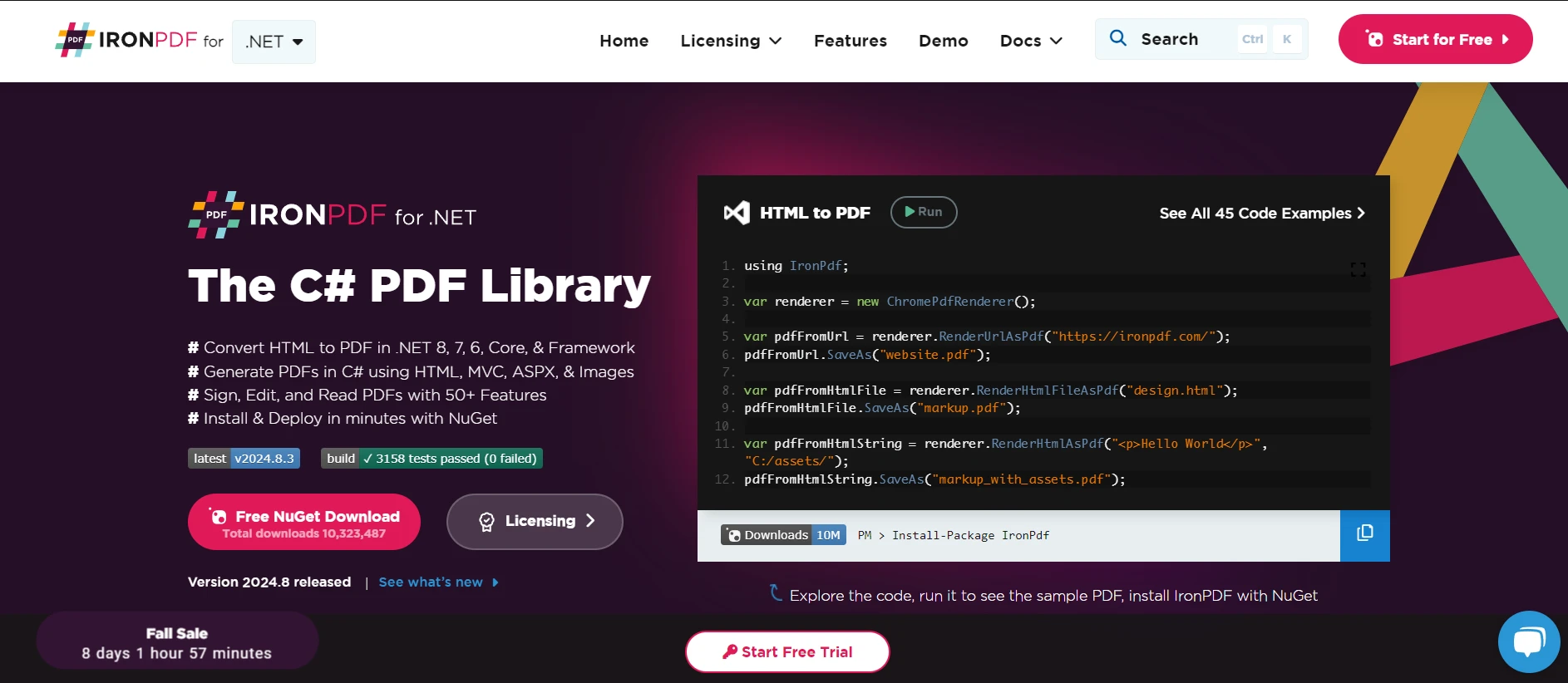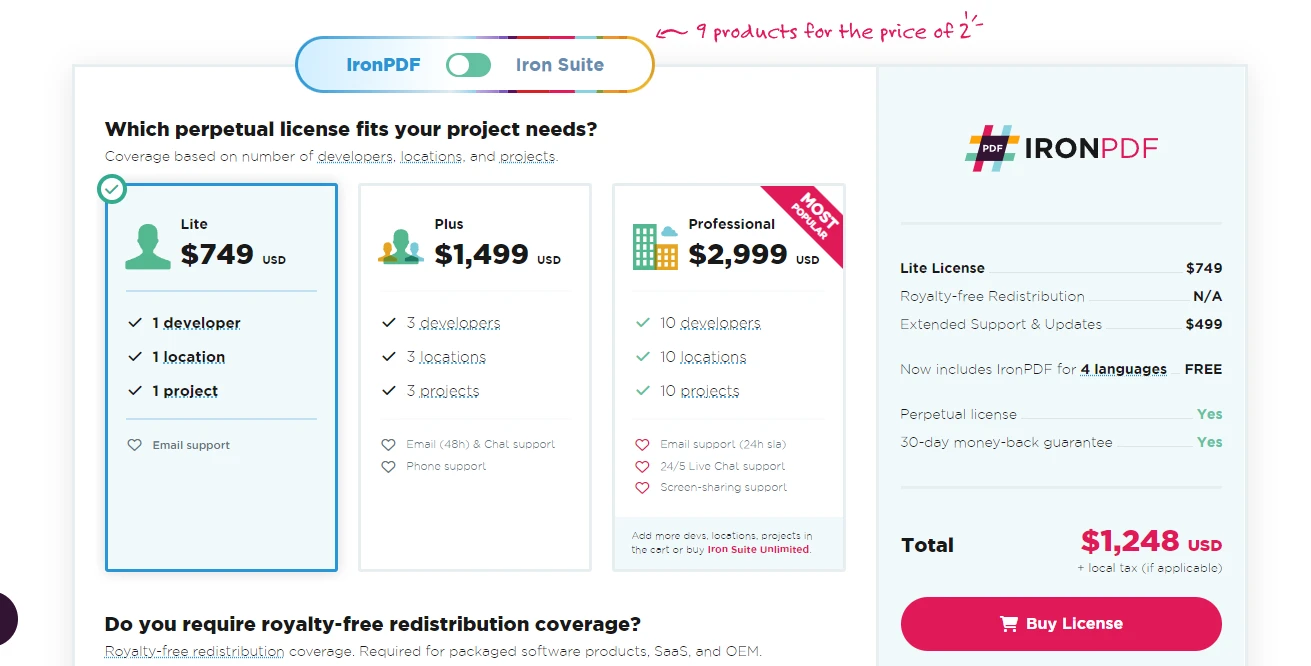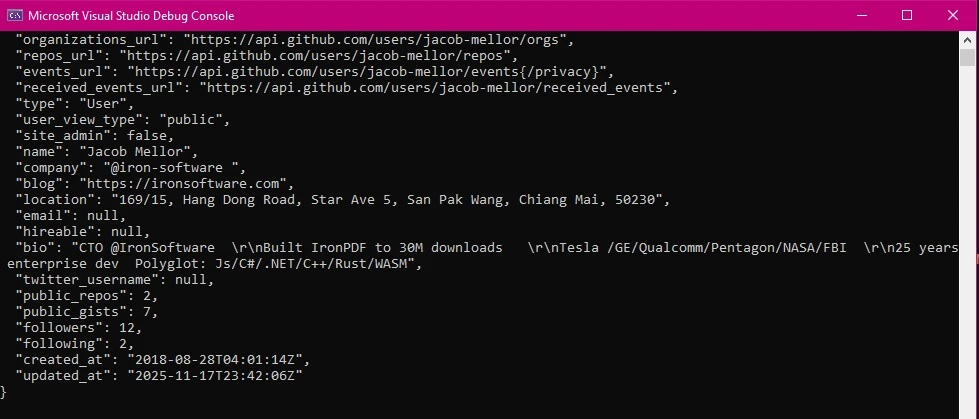C# Discriminated Union (How It Works For Developers)
Discriminated Unions, also known as tagged unions or sum types, represent a powerful tool to model data that can take different forms, but with well-defined and limited possible cases. Although C# doesn't have native discriminated unions like some other languages (e.g., F# or Rust), you can simulate discriminated unions using several techniques in the language. In this tutorial, we'll dive into discriminated unions, how to implement them in C#, and their practical use case with the IronPDF library.
What is a Discriminated Union?
In simple terms, a discriminated union is a type that can hold one of several predefined forms or values. It provides a way to create a type-safe structure that encapsulates different types or values while ensuring at compile time that only valid cases are handled.
Imagine a scenario where you want to represent the result of an operation. The operation can either succeed, returning some data, or fail, returning an error message. A discriminated union would allow you to represent these two possible outcomes in a single type.
Example: Simulating Discriminated Union in C#
Here’s an example of how you can simulate a discriminated union in C# using a class structure:
// Define an abstract base class representing the operation result.
public abstract class OperationResult<T>
{
// Private constructor to ensure the class cannot be instantiated directly.
private OperationResult() { }
// Nested class representing a successful operation result.
public sealed class Success : OperationResult<T>
{
public T Value { get; }
public Success(T value) => Value = value;
public override string ToString() => $"Success: {Value}";
}
// Nested class representing a failed operation result.
public sealed class Failure : OperationResult<T>
{
public string Error { get; }
public Failure(string error) => Error = error;
public override string ToString() => $"Failure: {Error}";
}
// Factory method to create a successful operation result.
public static OperationResult<T> CreateSuccess(T value) => new Success(value);
// Factory method to create a failed operation result.
public static OperationResult<T> CreateFailure(string error) => new Failure(error);
}// Define an abstract base class representing the operation result.
public abstract class OperationResult<T>
{
// Private constructor to ensure the class cannot be instantiated directly.
private OperationResult() { }
// Nested class representing a successful operation result.
public sealed class Success : OperationResult<T>
{
public T Value { get; }
public Success(T value) => Value = value;
public override string ToString() => $"Success: {Value}";
}
// Nested class representing a failed operation result.
public sealed class Failure : OperationResult<T>
{
public string Error { get; }
public Failure(string error) => Error = error;
public override string ToString() => $"Failure: {Error}";
}
// Factory method to create a successful operation result.
public static OperationResult<T> CreateSuccess(T value) => new Success(value);
// Factory method to create a failed operation result.
public static OperationResult<T> CreateFailure(string error) => new Failure(error);
}In this example, OperationResult<T> is an abstract class that represents our discriminated union type. It can either be a Success with a value of type T or a Failure with an error message. The private constructor ensures that instances of such a class can only be created through the predefined cases.
Using Pattern Matching with Discriminated Unions
C# provides powerful pattern-matching capabilities that work well with discriminated unions. Let’s extend our OperationResult<T> example with a method that handles different cases using a switch expression.
// Method to handle the result using pattern matching.
public string HandleResult(OperationResult<int> result) =>
result switch
{
OperationResult<int>.Success success => $"Operation succeeded with value: {success.Value}",
OperationResult<int>.Failure failure => $"Operation failed with error: {failure.Error}",
_ => throw new InvalidOperationException("Unexpected result type")
};// Method to handle the result using pattern matching.
public string HandleResult(OperationResult<int> result) =>
result switch
{
OperationResult<int>.Success success => $"Operation succeeded with value: {success.Value}",
OperationResult<int>.Failure failure => $"Operation failed with error: {failure.Error}",
_ => throw new InvalidOperationException("Unexpected result type")
};The switch expression here handles both the Success and Failure cases of the OperationResult<int>. This ensures that all possible cases are covered at compile time, providing type safety and reducing the risk of runtime errors.
Extension Methods for Discriminated Unions
You can extend the functionality of discriminated unions using extension methods. For example, let’s create an extension method for our OperationResult<T> to determine if the result is a success:
// Static class to hold extension methods for OperationResult<T>.
public static class OperationResultExtensions
{
// Extension method to check if the operation result indicates success.
public static bool IsSuccess<T>(this OperationResult<T> result) =>
result is OperationResult<T>.Success;
}// Static class to hold extension methods for OperationResult<T>.
public static class OperationResultExtensions
{
// Extension method to check if the operation result indicates success.
public static bool IsSuccess<T>(this OperationResult<T> result) =>
result is OperationResult<T>.Success;
}This static method checks if the result is an instance of the Success case.
Native Support for Discriminated Unions in C#
C# does not have native support for discriminated unions like some other languages, but there are ongoing discussions in the community about adding such a feature. Native discriminated unions would make it easier to define and work with union types without needing to rely on class hierarchies.
Compiler Errors and Type Safety
One of the key benefits of discriminated unions is the type safety they provide. Since all possible cases are known at compile time, the compiler can enforce that all cases are handled. This leads to fewer runtime errors and makes the code less error-prone.
For example, if you forget to handle a specific case in a switch statement, the compiler will produce an error, prompting you to address the missing case. This is especially useful when dealing with complex data structures with multiple possible cases.
Using IronPDF with Discriminated Unions in C#

IronPDF is a C# PDF library that helps developers create PDF files from HTML and allows them to modify PDF files without any hassle. When working with PDFs in C#, you can integrate IronPDF with discriminated unions to handle different scenarios when generating or processing PDF files. For example, you might have a process that either successfully generates a PDF or encounters an error. Discriminated unions allow you to model this process clearly. Let’s create a simple example where we generate a PDF using IronPDF and return the result as a discriminated union.
// Using directives for necessary namespaces.
using IronPdf;
using System;
// Define an abstract base class representing the PDF generation result.
public abstract class PdfResult
{
// Private constructor to ensure the class cannot be instantiated directly.
private PdfResult() { }
// Nested class representing a successful PDF generation result.
public sealed class Success : PdfResult
{
public PdfDocument Pdf { get; }
public Success(PdfDocument pdf) => Pdf = pdf;
public override string ToString() => "PDF generation succeeded";
}
// Nested class representing a failed PDF generation result.
public sealed class Failure : PdfResult
{
public string ErrorMessage { get; }
public Failure(string errorMessage) => ErrorMessage = errorMessage;
public override string ToString() => $"PDF generation failed: {ErrorMessage}";
}
// Factory method to create a successful PDF result.
public static PdfResult CreateSuccess(PdfDocument pdf) => new Success(pdf);
// Factory method to create a failed PDF result.
public static PdfResult CreateFailure(string errorMessage) => new Failure(errorMessage);
}
// Class to generate PDFs using IronPDF.
public class PdfGenerator
{
// Method to generate a PDF from HTML content and return the result as a PdfResult.
public PdfResult GeneratePdf(string htmlContent)
{
try
{
// Create a new ChromePdfRenderer instance.
var renderer = new ChromePdfRenderer();
// Attempt to render the HTML content as a PDF.
var pdf = renderer.RenderHtmlAsPdf(htmlContent);
// Return a success result with the generated PDF.
return PdfResult.CreateSuccess(pdf);
}
catch (Exception ex)
{
// Return a failure result with the error message if an exception occurs.
return PdfResult.CreateFailure(ex.Message);
}
}
}// Using directives for necessary namespaces.
using IronPdf;
using System;
// Define an abstract base class representing the PDF generation result.
public abstract class PdfResult
{
// Private constructor to ensure the class cannot be instantiated directly.
private PdfResult() { }
// Nested class representing a successful PDF generation result.
public sealed class Success : PdfResult
{
public PdfDocument Pdf { get; }
public Success(PdfDocument pdf) => Pdf = pdf;
public override string ToString() => "PDF generation succeeded";
}
// Nested class representing a failed PDF generation result.
public sealed class Failure : PdfResult
{
public string ErrorMessage { get; }
public Failure(string errorMessage) => ErrorMessage = errorMessage;
public override string ToString() => $"PDF generation failed: {ErrorMessage}";
}
// Factory method to create a successful PDF result.
public static PdfResult CreateSuccess(PdfDocument pdf) => new Success(pdf);
// Factory method to create a failed PDF result.
public static PdfResult CreateFailure(string errorMessage) => new Failure(errorMessage);
}
// Class to generate PDFs using IronPDF.
public class PdfGenerator
{
// Method to generate a PDF from HTML content and return the result as a PdfResult.
public PdfResult GeneratePdf(string htmlContent)
{
try
{
// Create a new ChromePdfRenderer instance.
var renderer = new ChromePdfRenderer();
// Attempt to render the HTML content as a PDF.
var pdf = renderer.RenderHtmlAsPdf(htmlContent);
// Return a success result with the generated PDF.
return PdfResult.CreateSuccess(pdf);
}
catch (Exception ex)
{
// Return a failure result with the error message if an exception occurs.
return PdfResult.CreateFailure(ex.Message);
}
}
}The PdfResult class represents a discriminated union with two cases: Success and Failure. The Success case contains a PdfDocument, while the Failure case holds an error message. The GeneratePdf method takes an HTML string, attempts to generate a PDF using IronPDF, and returns the result as a PdfResult. If PDF generation succeeds, it returns the Success case with the generated PDF. If an exception occurs, it returns the Failure case with the error message.
Conclusion

Discriminated unions in C# provide a powerful and flexible way to model data with multiple possible cases. Although C# doesn't support discriminated unions, you can simulate them using class hierarchies, pattern matching, and other techniques. The resulting code is more type-safe, less error-prone, and easier to maintain.
IronPDF provides a free trial to help you get a feel for the software without any upfront costs. You can explore all the features and see how they align with your needs. After your trial, licenses are available starting at $799.
Frequently Asked Questions
How can I create a discriminated union in C#?
You can create a discriminated union in C# by defining an abstract class with nested subclasses. Each subclass represents a possible case, such as a success or error state, and you can use pattern matching to handle these cases.
What is the role of the IronPDF library in handling discriminated unions?
The IronPDF library can be used alongside discriminated unions to manage PDF generation results. By modeling these results as discriminated unions, you can ensure type safety and handle both successful PDF creations and any errors that occur.
How does pattern matching enhance discriminated unions in C#?
Pattern matching enhances discriminated unions in C# by allowing developers to elegantly handle each possible case. With pattern matching, you can safely manage different outcomes, ensuring all scenarios are covered at compile time.
Why are discriminated unions beneficial for PDF generation in C#?
Discriminated unions are beneficial for PDF generation in C# because they provide a structured way to handle success and error cases. This approach ensures that potential issues are addressed at compile time, reducing runtime errors during PDF creation.
Can discriminated unions be extended for additional functionality in C#?
Yes, discriminated unions can be extended with additional functionality using extension methods. This allows you to add custom behaviors, such as checking the success status of a PDF generation, without altering the base structure.
Is there a way to simulate discriminated unions in C# without native support?
Yes, even though C# does not have native support for discriminated unions, they can be simulated using class hierarchies. An abstract base class can be used with nested classes to represent different possible outcomes, such as success or failure cases.
How can C# developers handle errors in PDF generation effectively?
C# developers can handle errors in PDF generation effectively by using discriminated unions to model potential outcomes. This approach ensures that errors are addressed at compile time, improving the reliability and maintainability of the code.
What are the advantages of using IronPDF with discriminated unions for C# projects?
Using IronPDF with discriminated unions in C# projects offers the advantage of robust error handling during PDF generation. This combination allows for clear distinction between successful operations and errors, enhancing code safety and reliability.
How do discriminated unions contribute to type safety in C#?
Discriminated unions contribute to type safety in C# by ensuring that all potential cases are handled during compilation. This reduces the likelihood of runtime errors and makes the code more predictable and easier to maintain.





















